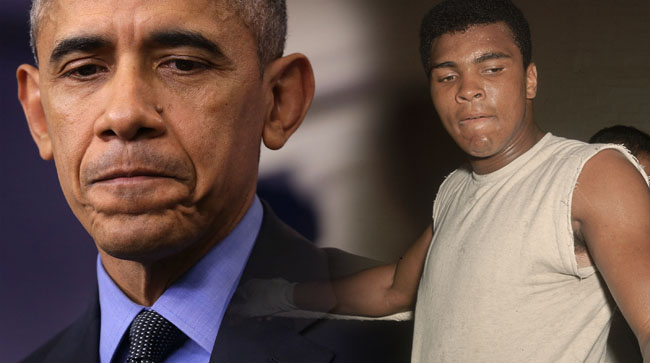
Many have shared their memories and feelings about the death of Muhammad Ali today, but few will come to the level that President Obama managed with his statement on the former heavyweight’s death. If it wasn’t clear before, Ali’s presence was bigger than boxing in many ways. The time that he reached his peak was also one of the most divided in American history, making him a symbol for the Civil Rights Movement alongside names like Malcolm X and Martin Luther King, Jr.
Obama notes that in his statement and expands into what Ali meant for him as a hero inside and out of the ring:
Muhammad Ali was The Greatest. Period. If you just asked him, he’d tell you. He’d tell you he was the double greatest; that he’d “handcuffed lightning, thrown thunder into jail.”
But what made The Champ the greatest – what truly separated him from everyone else – is that everyone else would tell you pretty much the same thing.
Like everyone else on the planet, Michelle and I mourn his passing. But we’re also grateful to God for how fortunate we are to have known him, if just for a while; for how fortunate we all are that The Greatest chose to grace our time.
In my private study, just off the Oval Office, I keep a pair of his gloves on display, just under that iconic photograph of him – the young champ, just 22 years old, roaring like a lion over a fallen Sonny Liston. I was too young when it was taken to understand who he was – still Cassius Clay, already an Olympic Gold Medal winner, yet to set out on a spiritual journey that would lead him to his Muslim faith, exile him at the peak of his power, and set the stage for his return to greatness with a name as familiar to the downtrodden in the slums of Southeast Asia and the villages of Africa as it was to cheering crowds in Madison Square Garden.
The president also made sure to note that his hero inside the ring did a lot out of the ring, and was hardly a perfect human being. But he notes that he brought his fight outside of the lights and spectacle of boxing, using it for good:
“I am America,” he once declared. “I am the part you won’t recognize. But get used to me – black, confident, cocky; my name, not yours; my religion, not yours; my goals, my own. Get used to me.”
That’s the Ali I came to know as I came of age – not just as skilled a poet on the mic as he was a fighter in the ring, but a man who fought for what was right. A man who fought for us. He stood with King and Mandela; stood up when it was hard; spoke out when others wouldn’t. His fight outside the ring would cost him his title and his public standing. It would earn him enemies on the left and the right, make him reviled, and nearly send him to jail. But Ali stood his ground. And his victory helped us get used to the America we recognize today.
He wasn’t perfect, of course. For all his magic in the ring, he could be careless with his words, and full of contradictions as his faith evolved. But his wonderful, infectious, even innocent spirit ultimately won him more fans than foes – maybe because in him, we hoped to see something of ourselves. Later, as his physical powers ebbed, he became an even more powerful force for peace and reconciliation around the world. We saw a man who said he was so mean he’d make medicine sick reveal a soft spot, visiting children with illness and disability around the world, telling them they, too, could become the greatest. We watched a hero light a torch, and fight his greatest fight of all on the world stage once again; a battle against the disease that ravaged his body, but couldn’t take the spark from his eyes.
Muhammad Ali shook up the world. And the world is better for it. We are all better for it. Michelle and I send our deepest condolences to his family, and we pray that the greatest fighter of them all finally rests in peace.
Hard to top in all facets. And as a guest mentioned on CNN this morning, Ali’s generation never had a President Obama in the White House. So Ali was it at the time, making this nod all the more meaningful.
